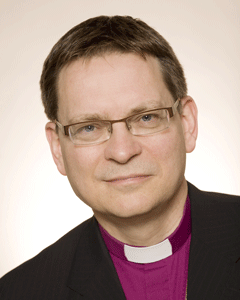
By Archbishop Colin Johnson
Easter changes everything. Nothing—not even death itself—is stronger than God’s love and God’s desire to give us life.
The resurrection of Jesus on Easter is at the heart of our faith. So important was it for the early church that it transferred the day of worship from the Sabbath, the last day of the week— one of the most ancient Jewish traditions, the “day of rest” because God had “rested” from his act of creation—to Sunday, the first day of the week, celebrating the resurrection of Jesus, the first act of the “new creation”. On every Sunday, even in Lent, we remember Easter. Every baptism joins the new Christian to the death and resurrection of Christ. Every Eucharist celebrates that “Christ has died, Christ is risen, Christ will come again.” Every funeral proclaims the hope that as we have died in Christ, so we will be raised to life with him.
So, the first account of the resurrection in Mark’s Gospel, Mark 16:1-8, is difficult to understand. It ends with the words, “The women came out and ran away from the tomb because they were frightened out of their wits; and they said nothing to anyone, for they were afraid.”
If we think about that for a while, and put ourselves in their shoes, it is not so difficult to see why they would react like that. So much had happened in those last few days of what we now call Holy Week. They did not know beforehand how it would turn out. In fact, so many terrible things had been done to their Teacher who had been beaten and killed, that they could safely assume that they would be next. They were in shock and grief.
This news that Jesus was not in the tomb was just too confusing and too frightening to bear. Jesus was dead and it made no sense that he was alive. They ran home to what was familiar, safe, certain.
That’s what we do when we are frightened—we seek out safety; we cling to what is familiar; we try to find and hold on to some certainty.
The eleven disciples refused to believe the women’s story. It was nonsense. According to one account, they locked themselves in a room, terrified that the authorities might find them. According to another account, Peter decided to go fishing, returning to the certainty of what he knew, his old way of life. The others went with him.
Mary Magdalene, in John’s Gospel’s account of Easter morning, was also in grief and denial. News of resurrection made no sense to her. She didn’t leave the empty tomb but she clung to the only explanation that made any sense: she was certain that somebody had taken and reburied the body somewhere else, or worse, stolen it. She wanted his body back.
Only when she heard her own name called by the voice of the one she so loved did she recognize the risen Christ. Even then, she wanted to cling to him, wanted everything to return to the way things had been before, back to normal.
It could not be like that anymore. It was not that her past experience was wrong. In fact, her past experience had prepared her for this moment. But she could not go back. She could not even stay where she was. Everything had changed.
As death changes everything, so does resurrection.
The first followers of Jesus were strengthened with the Holy Spirit, the first gift of the risen Christ to his people, his abiding presence with them, a dynamic, lively Spirit to move them forward. They were chosen to continue the mission of Jesus to heal the sick, free the captive, find the lost, and proclaim the good news of God’s love. God’s love brings people into a life-giving relationship with the Creator and with all creation.
The Spirit is Christ’s same gift to us, too. The Spirit’s presence changes us.
It took time for what had happened to sink in. It took even longer for each of the followers of Jesus to be changed by the new reality.
Change is a real challenge for most of us. A great Anglican theologian in the early 1600s, Richard Hooker, said that all change inconveniences us, even change from worse to better.
The church today is in the midst of rapid change. For all of us, it is a confusing time. For many, it is frightening. Maybe we should hunker down. Play it safe. Find the old certainties. Wouldn’t it would be nice to go back to the way it was (however we remember that)? Perhaps. But that is not what the risen Christ invites us to do. Christ’s resurrection makes all things new.
Where we have been has prepared us for what lies ahead. Looking back, we can rejoice in the gifts we have used well. Looking back, we ask forgiveness for our misuse of other gifts. Looking forward, because of Easter, we are invited to move confidently into the future that is alive with God’s promises—hopeful, alert, and joyful, sharing with others, often in new ways, our faith in this generous God who loves us so completely.
We might be frightened out of our wits. We might be inclined to tell no one. But the living Christ seeks us out, calls us by name, tells us to fear not, and through his Spirit gives us new life— in abundance!—so that we can be ambassadors of reconciliation and hope.